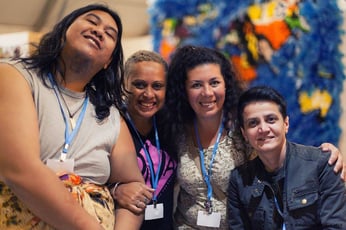Advocacy in Action
Mar 6, 2014

NEW YORK (March 5, 2014)-– On Monday, March 10th, the first session of the he Ad Hoc Working Group on the Durban Platform for Enhanced Action (ADP) will commence the fourth part of its second session in Bonn, Germany. In a scenario note prepared by the co-Chairs before the start of the session, they have outlined […]
NEW YORK (March 5, 2014)-– On Monday, March 10th, the first session of the he Ad Hoc Working Group on the Durban Platform for Enhanced Action (ADP) will commence the fourth part of its second session in Bonn, Germany. In a scenario note prepared by the co-Chairs before the start of the session, they have outlined some key objectives for this first meeting:
1) Advance as much as possible in the elaboration of the content of the 2015 agreement with a view of arriving at elements for a coherent draft negotiating text by the Lima Conference in December;
2) As part of the work on the 2015 agreement, initiate discussions in order to facilitate Parties’ domestic preparations for their intended nationally determined contributions;
3) Unlock opportunities for raising pre-2020 ambition, focusing on the practical realization of these opportunities.”
“In line with the decision to accelerate the development of the 2015 agreement, you agreed, in Warsaw, to further elaborate, beginning at the first session in 2014, elements for a draft negotiating text, taking into consideration the work of the ADP, including, inter alia, on mitigation, adaptation, finance, technology development and transfer, capacity-building and transparency of action and support. We propose to conduct this elaboration of textual elements in open-ended consultations.”
Gender Equality in the 2015 Climate Change Agreement
During COP19 in Warsaw, Poland, Parties laid out a timeline for the development of the 2015 agreement, agreeing to elaborate the elements of the new climate agreement as of their first meeting in March 2014, table an initial draft text by December 2014, and submit the formal draft text by May 2015, all with a view to enabling the negotiations to successfully conclude in December 2015.
In advance of the first meeting in March 2014, it is crucial that Parties work to ensure gender equality is fully integrated into the new climate agreement, taking into account the real needs of, and drawing on the perspectives, capacities and expertise of, women and men alike. Recent progress across UNFCCC decisions[1] reflects the need for gender considerations in the development and implementation of policies, programs and projects, including ensuring the full and effective participation of women in all levels of decision-making. This is coherent to several crucial normative frameworks reflective of the linkages between gender equality, women’s human rights & environment which Governments have already agreed (CEDAW, Hyogo Framework for Action, Rio+20, Agenda21, Beijing Platform for Action).
The links between gender equality and climate change is supported by undeniable data in terms of differentiated impacts and contributions to action. A gender perspective frames the enabling conditions needed for solutions to be effective as well as the potential of climate impacts to further exacerbate inequalities. Disproportionate impacts are faced by women given their social roles and economic status– particularly in relation to critically affected areas like water, agriculture, health, biodiversity and displacement. In addition, strong evidence indicates that ensuring women’s human rights is a driving force for enabling resilient societies, the improvement of livelihoods and enhanced action on climate change mitigation and adaptation (see resources for data in footnote)[2].
Already at the end of ADP2.3 in Warsaw, countries including Mexico and the LDCs advocated for gender equality to be integrated into the elements of the ADP. Though no country opposed the inclusion, short timescales and contentious issues meant that this language was not included.
Looking towards the further elaboration of a 2015 agreement, Parties are invited to work from the beginning toward an international agreement that maximizes our response to climate change while promoting gender equality and safeguarding women’s human rights. History has shown that when gender equality is not among guiding principles, actions exacerbate and create new inequalities rather than lessen them; policies, procedures, and programs are weak in implementation and impacts; and, intended solutions ultimately fail.
Any new climate agreement must work for real solutions for climate change, which cannot be achieved without the integration of gender equality and the full and effective participation of women. Gender equality is not and should not be seen as an ‘add on’ issue to the ADP deliberations, nor one that should be dealt with in a separate track alone. Rather, it is a transformative approach and principle, to be included from the beginning in the consideration of the elements of the new agreement.
[1] See WEDO Compilation of UNFCCC Decision Text (2013) plus Gender Equality Language in Warsaw Outcomes
[2] For examples: See WEDO Statement to 2014 CSW58; See “Linking Data & Actions” 2013 WEDO Factsheet on Gender, Data & IPCCAR5; See ‘Financing Mitigation: Exposing Gender Gaps” 2013 WEDO Factsheet.
Resources

Support Our Work
Your donation provides us with the stable foundation we need to build the feminist future we’re working to realize.
Donate Today